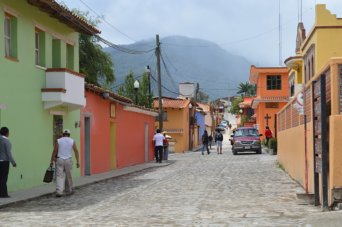- About
- Topics
- Picks
- Audio
- Story
- In-Depth
- Opinion
- News
- Donate
- Signup for our newsletterOur Editors' Best Picks.Send
Read, Debate: Engage.
Indigenous people from Capulálpam de Méndez in the southern Mexican state of Oaxaca recently proved that it is possible to say "no" to the destruction of the environment caused by international companies.
The town lived off of the mining industry since the Spanish opened the mine during colonial times. After the independence, the extraction of gold and silver was ongoing, with more or less intensity, because of concessions granted to local and international companies by the Mexican government. However, in February this year, a federal judge decided to cancel the concessions of the Canadian company Continuum Resources LTD, and the local company Minera la Natividad y Anexas as a result of persistent and well-organised efforts of the local community. It is a historical milestone in the fight of indigenous communities against mining activities in Mexico.
The success of the Zapotecs in Capulálpam is due to various things. First, the connection indigenous people have to nature did not allow for its destruction. Mostly before the 80s, the territories of Capulálpam were exploited by logging and mining companies. And such was the situation across the state until the indigenous communities said enough. They did not want to trade new roads and job opportunities for healthy forests and clean water sources. They united and thanks to negotiations with the government and were able to gain back the control over their forests.
As a result, in many towns and villages, including Capulálpam, it led to developing sustainable forest management that has become exemplary in Mexico. Yet, the concessions for mining in Capulálpam were still in place, even though the community did not allow the companies to fully run the mine.
In cooperation with experts on the environment, Zapotecs from the town started collecting evidence as to how the operation of the mine was destroying the local environment as well as the environment of the surrounding villages, mostly those located along the flow of the river coming from Capulálpam.
They also prepared all the documents necessary to prove that the company had not consulted its activities in the territory of Capulálpam with the local population. According to the United Nations Declaration on the Rights of Indigenous Peoples, they were supposed to do so. In the end, this was the decisive argument for the federal judge to order the cancellation of the concessions.
In the process, the locals have become experts in environmental protection and where they needed, they invited people from outside to assist them. The cancellation of the concessions was a result of common and well-thought effort that the whole community participated in.
The Zapotec community managed to say "yes" to life and "no" to mining, as it is a motto of activists in Oaxaca who protect their territories. They refused the well-established model in which big, often multinational companies make profit from destruction, and us – individuals or communities – are left with the consequences. In this, we can find inspiration – it is possible to find other ways.

